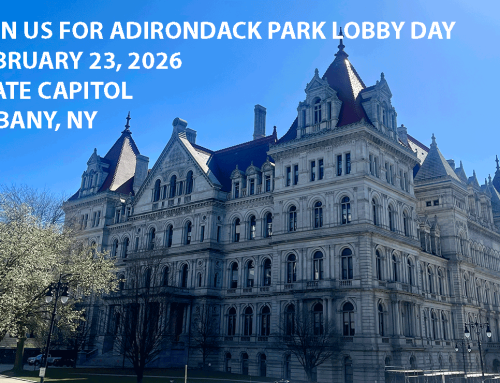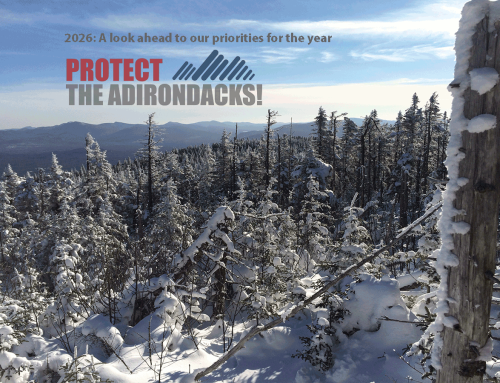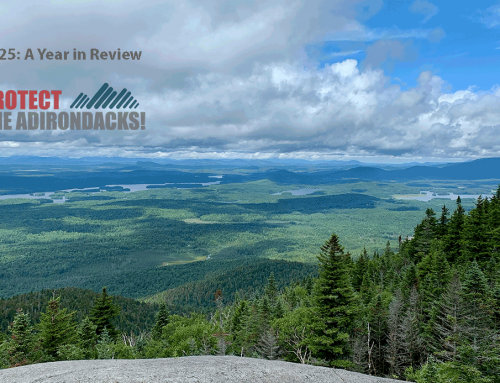Join the Paddle for Wilderness on Saturday, September 13th. This is a great way to protest for the protection of the 36,000-acre Whitney Park and celebrate the Adirondack wildlands canoeing legacy of Peter and Ann Hornbeck.
Sign up for the Paddle for Wilderness on Saturday September 13th at Forked Lake in the central Adirondacks in Long Lake at 10 AM. The Paddle for Wilderness is a floating protest calling for the protection of the 36,000-acre Whitney Park that is up for sale and threatened with development. The Paddle for Wilderness will also brings together paddlers to honor the wildlands canoeing and kayaking legacy of Peter Hornbeck (1943-2020) and Ann Hornbeck (1948-2025), the founders of Hornbeck Boats, the popular lightweight canoes and kayaks, used all around the Adirondacks and beyond.
This is a great opportunity to join with other paddlers and put your paddle in the water for wild places, quiet and motorless waters, and the Forest Preserve. The event takes place at Forked Lake, which borders the south end of the 36,000-acre Whitney Park, which is up for sale and threatened with development.
Sign up below for this event. The event is $100 per person to help raise funds for the “Campaign for Quiet and Motorless Waters.” There will be a reception afterwards with snacks and beverages. Please register using this link.
Peter and Ann Hornbeck’s Paddling and Adirondack Forest Preserve Legacy
Peter Hornbeck (1943-2020) and Ann Hornbeck (1948-2025) founded Hornbeck Boats in 1973. Pete was the master boatbuilder of lightweight canoes and kayaks with a distinctive red stripe below the gunwales, famous throughout the Adirondacks and beyond, and was also a Founding Board member of Protect the Adirondacks in 2009 and served on the Board of the Residents’ Committee to Protect the Adirondacks (RCPA) before that from 1993 to 2009, serving eight years as the Chair.
Pete was an unwavering advocate for the public Forest Preserve, especially on the need for more Wilderness lands in the Adirondack Park. He was a strong supporter of state land purchases to expand the public Forest Preserve. But the thing that he most cherished was Wilderness. He loved the wild, motorless waters of the Adirondacks. He took a lead role when the RCPA organized the Canoe-In for Wilderness at Little Tupper Lake in 1998.
Pete and Ann founded Hornbeck Boats in 1973 and built lightweight canoes in the spirit of famed 19th century Adirondack boatbuilder John Henry Rushton of Canton, who had made the Sairy Gamp, among many other boats, which was used by George Washington Sears to paddle far and wide across the Adirondacks, trips memorialized in a series of popular articles written under the pen name Nessmuk. “Hornbecks” became known far and wide, growing in popularity because they were extremely lightweight, incredibly durable, easy to turn on twisting Adirondack rivers, great for fishing, and easy to portage or haul over a beaver dam. Hornbecks were made first with Kevlar and then with carbon fiber, which created a 10-foot boat at 12 pounds in weight, ideal for pond-hopping in the Adirondacks. Today, Hornbeck Boats is run by Pete’s daughter and son-in-law, and focuses on different lines of solo and tandem canoes, the newest being the New Tricks series, and kayaks. In 2025, Hornbeck Boats branched out and opened a store in Minneapolis, Minnesota.
Ann Hornbeck taught social studies at Minerva Central School for three decades, retiring in 2002. She did the books for Hornbeck Boats and kept the business afloat in its early years and helped it to expand in later years. She was a quilter with a wide circle of friends, who enjoyed her daughter, grandsons, and walking through her 150-acre forest that surrounded her home in Olmstedville.
Whitney Park is Up for Sale and Threatened with Development
The 36,000-acre Whitney Park in Long Lake is up for sale and a real estate developer from Dallas, Texas says he wants to buy and develop the tract. The property is currently held by a Trust following the untimely death of its owner in 2024. Whitney Park has been a high priority property listed in the New York’s “Open Space Conservation Plan” for decades. The latest version of this Plan described the tract as “a 36,000 acre property in Hamilton County that has been devoted to forest and wildlife management for over 100 years and contains enormous outdoor recreational potential.” Whitney Park’s interconnected waterways are not only part of a historic 19th century canoe route, they also provide great ecological connectivity through the central Adirondack Park. Whitney Park includes 22 lakes and ponds, over 100 miles of undeveloped shoreline, and is lightly developed with continuous high forest canopy.
The stakes are high. As goes Whitney Park, so goes the Adirondack Park.
Protect the Adirondacks is urging Governor Kathy Hochul and the Department of Environmental Conservation Commissioner Amanda Lefton to negotiate purchase of Whitney Park for the Forest Preserve, or as a conservation easement, or a combination of the two. It’s vital to the future of the Adirondack Park that Whitney Park is protected in perpetuity.
Click here to send Governor Hochul a message to protect Whitney Park.

Slim Pond is one of 22 undeveloped lakes and ponds on the 36,000-acre Whitney Park tract that is up for sale and threatened with development.
Forked Lake
The Paddle for Wilderness on Saturday September 13th will be based out of the Forked Lakes Campground, which will be closed for camping at that time, but open to the public for recreation. The campground provides a great setting to launch canoes and kayaks and provides ample parking and easy access to Forked Lake. The Paddle for Wilderness will start and end at the Forked Lake Campground. Information and directions to Forked Lake Campground are available here.
Forked Lake is a long and beautiful lake. The south shore is mostly public Forest Preserve lands. The north shore of Forked Lake borders lands at the southern boundary of the 36,000-acre Whitney Park that is up for sale and threatened with development. The future of Whitney Park will shape the future of Forked Lake, which is now one of the Park’s great flatwater camping locations, with a state campground at its east end, and primitive campsites at its west end.

Forked Lake is bordered by public Forest Preserve on its south side and Whitney Park to the north. It’s a great flatwater paddling destination.
Campaign for Quiet and Motorless Waters
One great myth about the wild Adirondack Park is that there is an abundance of motor-free lakes and ponds. In fact, the Park faces a scarcity of quiet waters where one can paddle a canoe or kayak without interruption from motorboats, jet skis, floatplanes, and other types of motorized watercraft.
Of the 200 largest lakes and ponds in the Adirondack Park, the overwhelming majority of big lakes and ponds provide abundant opportunities for motorized watercraft—but scant opportunity for quiet, motor-free waters. Among those 200 largest lakes, 114 are open for motorboating, 55 are private with no public access, 31 are motor-free. 12 of the 29 motor-free lakes are inaccessible and involve a lengthy hike carrying one’s boat.
Protect the Adirondacks supports more motorless and quiet lakes for the public across the Adirondacks.
Register for the Paddle for Wilderness on Saturday September 13th at Forked Lake
CLICK HERE to register for the Paddle for Wilderness.
Please click here to pay the $100 registration fee. Click Special Events for $100 per person.










